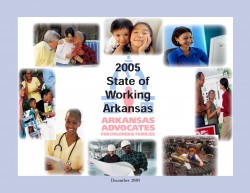
The last six years have been an unpredictable rollercoaster ride for the Arkansas economy, Arkansas workers, and families. During the last part of the 1990s, a thriving national economy led to near record employment (by recent historical standards), growing wages for most workers and families, and flush tax revenues for most state governments. This was followed by the tragic terrorist events of 9/11 and a recession at the beginning of the decade that resulted in higher unemployment, stagnant wages, declining job quality, and slowing tax revenues in many state governments (especially as tax cuts enacted in better times began to take effect).
The national and state economies have begun to improve the last year or two, resulting in lower unemployment, if not necessarily in better jobs and higher wages for workers and families. This improvement, however, is occurring at a time when there is growing uncertainty over the economy. The continued decline of manufacturing, the economic devastation wrought by hurricanes Katrina and Rita (the implications of which are national in scope), rising energy costs, rising inflation and interest rates, and the threat of a housing bubble bursting have led some economists to question whether an economic slowdown might again be on the horizon.
This report is the third installment of The State of Working Arkansas. Previous editions (2000 and 2002) documented the economic status of Arkansas families and identified major issues that need to be addressed to move families forward in an increasing volatile state and national economy. The State of Working Arkansas 2005 is our effort to make sense of recent economic trends and how Arkansas families are faring on this economic rollercoaster. What has this rollercoaster meant for employment, job quality, wages, poverty, family assets, access to health care, and other basic family needs? This report shows that by any measure, the recession that hit the U.S. and Arkansas at the beginning of the decade has hit Arkansas families hard.
Arkansas has taken the initial steps to improve the well-being and income earning power of families by reforming its education system, investing in quality pre-school education, and improving health care for children. However, while the economy has recently picked up, structural flaws in the Arkansas economy – low paying jobs, future jobs that will continue to pay low wages, high poverty rates, jobs without health care coverage, a tax system that hurts low-income families, and an education system that still trails other states – mean that many Arkansas families will continue to struggle unless we take new steps to move forward. While it was beyond the scope of this report to discuss new policy options for the future, it does identify areas that need improvement. We hope this will lead to new public discourse about the economic plight of families and areas for future policy change.
Unless otherwise noted, the data in this report relies heavily on the Current Population Survey (CPS), a survey conducted by the U.S. Census Bureau for the U.S. Bureau of Labor Statistics. The CPS is a monthly survey of households nationwide dealing with wages, income, employment, health insurance and demographic factors such as race, age, gender, and race. The CPS is the primary source of information on the U.S. labor force. Unless otherwise noted, the CPS data that appears in this report has been compiled and provided to us by the Economic Policy Institute (EPI), an economic research organization based in Washington, D.C. EPI has produced its own State of Working America report every two years since 1988. We gratefully acknowledge their support in making this data available to us.
